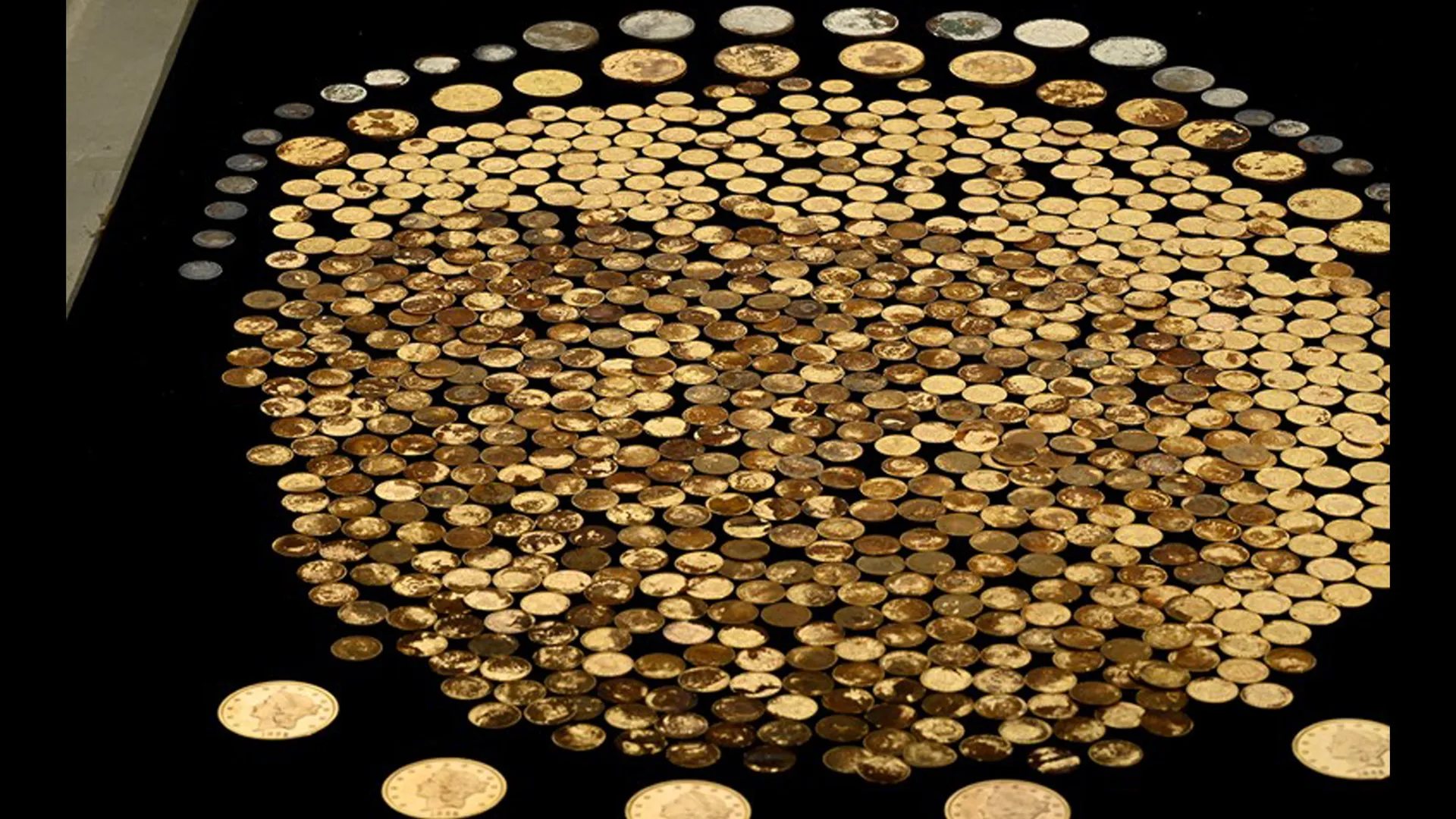
Posted on 07/10/2023 4:55:33 PM PDT by Enterprise
A Kentucky man got the surprise of his life while digging in his field earlier this year: a cache of over 700 coins from the American Civil War era.
The "Great Kentucky Hoard" includes hundreds of U.S. gold pieces dating to between 1840 and 1863, in addition to a handful of silver coins. In a short video, the man who discovered the hoard — whose identity and specific location have not been revealed to the public — says, "This is the most insane thing ever: Those are all $1 gold coins, $20 gold coins, $10 gold coins," as he aims his camera at the artifacts tumbling out of the dirt.
According to the Numismatic Guaranty Co. (NGC), which certified the coins' authenticity, and GovMint, where the coins were sold, 95% of the hoard is composed of gold dollars, along with 20 $10 Liberty coins and eight $20 Liberty coins. The rarest is the 1863-P $20 1-ounce gold Liberty coin. Just one of these coins can go for six figures at auction, and the Great Kentucky Hoard boasts 18 of them. NGC's website notes that the $20 Liberty coin, which circulated from 1850 to 1907, was minted by the Treasury Department after gold was discovered in California. The $20 Liberty coins in the hoard are even rarer because they do not include "In God We Trust," which was added in 1866 after the end of the Civil War.

(Excerpt) Read more at livescience.com ...
I had to look it up, and yes, they tax the value of it as income for the year that it was found. What is the highest tax rate now - something like 35%? So most of this would get taxed at that rate. And he will need to pay it for this tax year, so he can’t sit on the ones he will sell for too long to get the best price.
And then as another poster stated, if a $20 gold piece was valued at $100,000 today but sold for $150,000 in a few years, the $50k would be taxed as well.
Hmm. So $100k coin with $65k left after taxes. I wonder if the IRS will say “Seeing as we taxed you right off, your coin was really only worth $65k, and you sold it for $150k, so you now owe us on the capital gain of $85k!” (I better not give them any ideas.)
A friend recently bought a house built in the 1870’s. I’ve been toying with getting a metal detector and going over the property.
I don’t think that’s correct. He can lawfully count it as income at face value. Maybe $900 or whatever it is exactly. They are still legal tender. Naturally nobody will spend a $20 gold piece at WalMart, but he could. In that sense it is no different than finding a stack of cash.
At some point, however once they are sold for a profit and realized, then that is a different matter. A good tax attorney might able to provide some strategy of setting up a sheltered trust or some jiggery-pokery like that. Nice problem to have.
Way back in the USENET days somebody posted a story about a buddy who was knocking down an old farmhouse in the early 1970s. His buddy pulls up and motions him over at a rural gas station, opens the trunk, said it was completely stuffed full with cash. Huge sum. Said his buddy drove away, never saw or heard from him again. Always wondered what the deal is with things like that. Some spook !hit, commie spies, something. Somebody never made it back to retrieve it. Farmers are pretty frugal though sometimes.
LaVere Redfield was a guy from California who drove around the country in the 50’s and 60’s collecting $1000 face bags of silver dollars from various banks and took them home, he dropped them down a coal chute behind a false wall in his basement. Huge hoard of pristine silver dollars.
Bruse Williams was a financial radio talk host years ago. I remember several calls where someone would be renovating and finds a cache of money. One was a box of old coins. The caller asked if he had any responsibility to give the coins to the previous owner. Since all of the coins predated the point where the previous owner bought the home, he had no reason to share.
The last time I sold a house, I left the buyer a letter with water shutoff locations, trash rules and some other things about the house and neighborhood. I told him that I buried $20,000 somewhere in the backyard and forgot where. I heard he got a good laugh out of that one.

We have lots of those too.
However, we have found old computer parts, household trash, roofing shingles and lots of old carpet buried here.
Apparently while the land was being unused for living, people used it as a dumping grounds for their trash. I don’t think any one person could have produced to much.
We get rid of it as we find it.
I found an 1840 political token in my back yard. It has Andrew Jackson emerging from a treasure chest on one side and a donkey (jack-ass) on the other. It represents one of the first usages of a donkey to represent the Democrat Party.
There’s no estimate in the article. I am speculating that the worth is somewhere in the 8 figure range, not because of the worth of the gold itself, but because of collector value.
Upon further review: “The donkey (also known as a jackass) as a Democratic symbol dates back to the late 1820s, when Whig attacks against Andrew Jackson rendered his name as “A. Jack-ass.” Medals illustrated with donkeys and pigs bore slogans criticizing Jackson for removing federal deposits from the Bank of the United States.”
Most of them likely are not worth that kind of value.
So the question is if there is a minimum on what “income” you gained in that year.
In racing, there is a cap on how much you can win, untaxed. Generally that is around 10k. I can win 5000 on a single race and not be taxed.
Now, if they add up all the hundreds of coin values as actually sold, then it might be taxed. Individually it might not be, and off course probably depends on what you sold, when.
People either think these are “worthless” or Worth millions.
Reality is somewhere between. These coins might be in great shape, but might be hurt a bit by burial. I doubt they are MS-70 and would not even assume Mint State 60. Circulated, but in pretty good shape (remember most of those coins were probably in circulation for a while before burial).
So, many of the gold might be worth a few thousand, some less, some more.
It is very dependent on condition, rarity, year, and variations.
https://www.pcgs.com/prices/us
Weren’t all gold coins pulled from circulation by FDR during the Depression?.........The Feds will seize this gold...................
I find old beer pull tabs....................
Funny you mention that. A few months back I was thinking the same thing, and I was wondering if my five year old daughter would ever see a wheat penny. Sure enough a few days after I was thinking about that, I got a handful of change that included a 1951 wheat penny.
I was amused by the serendipity and mentioned it on a thread shortly after. Another FReeper (I don't recall who) mentioned they had recently gone through a large number of pennies and estimated around 1% of the batch he had gone through were wheat pennies.
Yes. It sold for $155 million. I think he paid $3.4 million.
Indeed. It was a significant horde of wealth. It always makes you wonder about the circumstances surrounding why it was never recovered.
Interesting about basing it on the cash value. I do recall that story about the trunk full of cash. IIRC his friend was part of a metal dectorists group that the guy used to belong too. But the guy quite detectoring and instead explored abandoned houses for treasures.
My wife’s grandfather hid all sorts of cash in the walls of his farmhouse (depression raised). Fix an outlet and there would be ten hundred dollar bills folded up in there! And other places too.
I was out of the country when the mother-in-law was quick to sell it after he passed. I had wanted to fly out there to go through the place before it sold. And two out-buildings FILLED with stuff.
I wonder if the new buyers (a large developer) went through the house first or if they just bull-dozed it all down.
Disclaimer: Opinions posted on Free Republic are those of the individual posters and do not necessarily represent the opinion of Free Republic or its management. All materials posted herein are protected by copyright law and the exemption for fair use of copyrighted works.